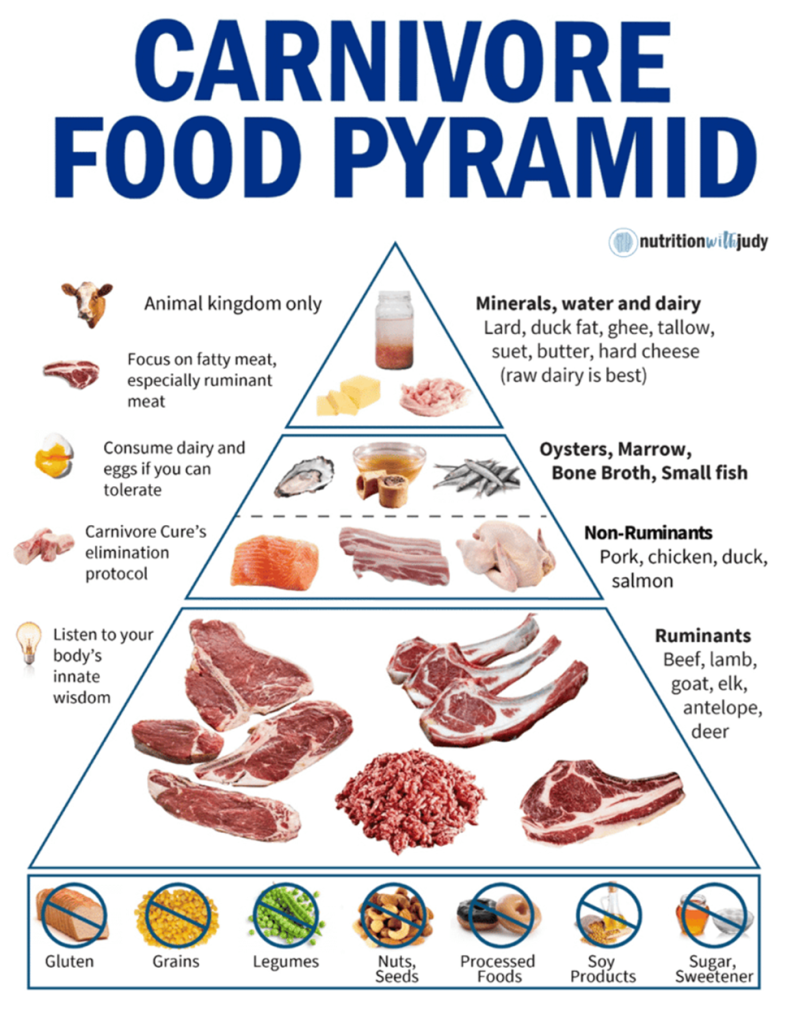
By Savanna DeHay
What if you only consumed animal products? Would you drop dead in a week from too much saturated fat? Would copious amounts of salt lead to strokes and heart disease? Is it possible you’d never poop again?
The carnivore diet is diametrically opposed to the deceptive and corrupt agendas of the FDA and Big Pharma. History has repeatedly shown that the government rarely acts in the best interest of the people, making it worth questioning whether the carnivore diet truly is deserving of all the criticism it receives. Let’s evaluate.
What is it?
The carnivore diet involves consuming only foods that come from animals. Most carnivores also eat dairy and eggs. There are various ways to follow a carnivore diet. Here are a few common variations (Nutrition with Judy):
- Animal-Based Diet: Mostly meat with raw dairy, eggs, fruit, and honey. Good for metabolically healthy individuals, athletes, and children.
- Carnivore-Keto Diet: Mostly meat and healthy fats with dairy, eggs, and low-carb fruits, vegetables, nuts, and seeds. A great option for people who are metabolically healthy or want more variation in their diet.
- Zero-Carb Carnivore Diet: Mostly meat with organs, dairy, and eggs. Some organs and dairy products contain carbohydrates, but this is very minimal. Those wanting to consume the most nutrient-dense foods while minimizing toxins might consider this variation.
- Nose-to-Tail Carnivore Diet: Just meat and organs (plus salt and water). Organs are nutritional powerhouses and can greatly enhance the nutrient profile of the diet.
- Lion Diet: Ruminant meats only (plus salt and water). For those with autoimmune conditions, this is an excellent way to put them into remission.
- Beef-Only Carnivore Diet: Exclusively beef protein (plus salt and water). This can be helpful for deep healing or an elimination diet. However, this should only be short-term due to the risk of nutrient deficiencies.
*Note that the beef-only carnivore diet is the only variation that may lead to nutrient deficiencies.


Benefits
The carnivore diet is great for:
- Healing autoimmune conditions
- Improving metabolic health
- Healing Irritable Bowel Syndrome (IBS)
- Reducing inflammation
- Boosting mental health
- Losing weight
- Building muscle
- Preventing and healing food intolerances and allergies
- Eliminating processed foods
- Obtaining the most nutrient-dense bioavailable vitamins and minerals
- Simplicity
- Saving money
- Mindful eating

Additionally, many carnivores find comfort in knowing that their diet naturally provides nutrient-dense foods, rich in protein and fat – everything their body needs to thrive. One fascinating aspect of this diet is that it greatly decreases the need for certain vitamins and minerals. Turns out, carbs are vitamin and mineral hogs!

Fruits and Vegetables – Nutrients
We have been told for decades to eat our fruits and veggies, but have we ever stopped to ask: Do these foods truly deserve to be called “superfoods?” Let’s take a closer look by comparing the nutritional profiles of common “superfoods” with those of meat and organs:

As we can see, beef and beef liver provide significantly more vitamins and minerals than plant foods. Moreover, animal proteins are packed with nearly all essential nutrients our bodies require, while plant foods typically offer a limited range of nutrients – often lacking in key micronutrients.

Plant foods are not the nutritional powerhouses we were always told; many even contain harmful compounds called anti-nutrients. According to Atli Arnarson, BSc, PhD from Healthline, “[a]ntinutrients are plant compounds that reduce the body’s ability to absorb essential nutrients,” (Anarson). While there are multiple types of anti-nutrients, their harmful effects can sometimes be reduced through specific preparation methods. However, even in small amounts, anti-nutrients can have detrimental effects. Techniques such as boiling, fermenting, soaking, or sprouting can help diminish certain anti-nutrient compounds – though not all methods are equally effective for every type of plant-based compound.

What About Fiber?
Fiber is a carbohydrate that cannot be digested or absorbed. It is non-essential because the body does not require it nor is it crucial to maintaining optimum health. However, individuals following the Standard American Diet (SAD) – or those consuming large amounts of sugar and refined carbs – may benefit from increasing fiber intake to support digestion.
The two types of fiber – soluble and insoluble – play a key role in regulating blood sugar and promoting smooth digestion. Without fiber, inflammatory carbs and sugars would linger longer in the body, potentially causing harm. The studies suggesting fiber helps prevent heart disease, colon cancer, and other conditions are misleading. Fiber may appear to “prevent” these conditions but it’s the act of choosing whole nutrient-dense foods over processed junk like donuts and French fries that makes the real difference.
Fiber is beneficial for those following the SAD, or consuming large amounts of carbs. However, if you’re eating a healthy, low-carb diet, fiber is neither necessary nor useful.

A study conducted by the World Journal of Gastroenterology shows that fiber worsens constipation. Over 60 patients who suffered from chronic constipation were asked to refrain from consuming fiber for two weeks. After two weeks, they were told to consume an amount of fiber they found personally acceptable, (DeLauer). The results:
- Zero Fiber: Bowel frequency increased from every 3.75 days to every 1.0 day
- Reduced Fiber: Bowel frequency increased from 4.19 days to every 1.9 days
- High Fiber: Bowel frequency experienced no change (constipation remained)
Fiber does not contribute to weight loss, chronic disease prevention, nor does it support the gut microbiome. If you enjoy your fruits and veggies, by all means, go ahead and enjoy them! Just know, for those following a healthy animal-based diet,
fiber is neither necessary nor particularly beneficial – your nutritional needs are already met without it.

Final Thoughts
The carnivore diet may initially sound extreme – after all, we’ve been told our whole lives that plants are the ultimate source of nutrition. But the results speak for themselves: people experience remarkable healing simply by eating a carnivore diet!
Even swapping out just some of the plant foods and grains for more meat can have a tremendous impact on your wellbeing. So, what are you waiting for? Toss those fruits and veggies that are already spoiling – and make room in your freezer for nutrient-dense meat instead. Your body wasn’t designed to thrive on grains and greens — it was built for meat.
- Chewy flavorful keto-carnivore jerky sounds yummy, right? Use the code SAVANNA20 to get 20% off your order from Matt-Hat Jerky!
- Or what about delicious keto chocolate? Go to The Good Chocolate to get a variety of keto chocolate today!
- Not only can you eat beef tallow, but you can also use it as a hydrating lotion! Head to Purely Tallow to learn more.
Works Cited
- Anarson, Ayli, BSc, PhD. How to Reduce Antinutrients in Foods. Healthline, 18August 2023, https://www.healthline.com/nutrition/how-to-reduce-antinutrients. Accessed 13 August 2025.
- Anti-Nutrients. Carnivore, https://carnivore.diet/anti-nutrients/. Accessed 13 August 2025.
- Autoimmune Health. Carnivore Diet, https://carnivore.diet/category/success-stories/autoimmune-health/. Accessed 7 August 2025.
- Cantor, Matt. Excessive ice tea leads to man’s kidney failure. USA Today, 2 April 2015, https://www.usatoday.com/story/news/2015/04/02/excessive-ice-tea-leads-to-mans-kidney-failure/70821424/. Accessed 14 August 2025.
- Carnivore diet: what if we only ate meat? Institute for Optimum Nutrition, https://www.google.com/url?q=https://ion.ac.uk/articles/carnivore-diet&sa=D&source=docs&ust=1755290283646112&usg=AOvVaw2McTAkTqqLm0JR0vKqZpmx. Accessed 15 August 2025.
- DeLauer, Thomas. Carnivore Diet – What They Don’t tell you about Fiber. YouTube, 1 October 2019, https://www.youtube.com/watch?app=desktop&v=dVjAy_JDE2o&t=30s. Accessed 20 August 2025.
- Emmerich, Maria. ANTINUTRIENTS. Maria Mind Body Health, 17 March 2021, https://mariamindbodyhealth.com/antinutrients/. Accessed 11 August 2025.
- H&S Crew. THE BEGINNER’S GUIDE TO PLANT TOXINS (WHY ANTINUTRIENTS MATTER). Heart & Soil, 7 March 2024, https://heartandsoil.co/blog/the-beginners-guide-to-antinutrients/. Accessed 14 August 2025.
- Kiltz, Robert. What is the Carnivore Diet? Doctor Kiltz, 10 January 2024, https://www.doctorkiltz.com/carnivore-diet/. Accessed 4 August 2025.
- Kummer, Michael. Carnivore Diet and Fiber: What You Need To Know. Michael Kummer, 28 July 2025, https://michaelkummer.com/carnivore-diet-and-fiber/#. Accessed 20 August 2025.
- Nutrition with Judy. The Carnivore Diet for Weight Loss. Nutrition with Judy 27 January 2024, https://www.nutritionwithjudy.com/the-carnivore-diet-for-weight-loss, Accessed 6 August 2025.
- So, Daniel. Whelan, Kevin, Rossie, Meghan, Morrison, Mark, Holtmann, Gerald, Kelly, Jaimon T, Shanahan, Erin R, Staudacher, Heidi M, and Campbell, Katrina L. Dietary fiber intervention on gut microbiota composition in healthy adults: a systematic review and meta-analysis. 1 June 2018, NIH, https://pubmed.ncbi.nlm.nih.gov/29757343/. Accessed 20 August 2025.
- Vasquez, Isabel. RD, LDN. What Happens to Your Body When You Eat Too Much Fiber. Eating Well, 20 August 2025, https://www.eatingwell.com/article/8043390/too-much-fiber/. Accessed 20 August 2025.
- Vintages. Reddit, https://www.reddit.com/media?url=https%3A%2F%2Fpreview.redd.it%2Fitracbmjya291.jpg%3Fwidth%3D320%26crop%3Dsmart%26auto%3Dwebp%26s%3Dd8894fd8b3c3ffef7a10c270137150bd94820ed9. Accessed 11 August 2025.
- 20 Benefits of the Carnivore Diet: Health & Wellness Gains. Renal Dosage, 13 February 2025, https://renaldosage.com/blog/benefits-of-the-carnivore-diet. Accessed 11 August 2025.
About Savanna DeHay
Savanna DeHay graduated from North Idaho College in 2022, and currently lives in North Idaho. She writes about health, current events, and other important issues.













